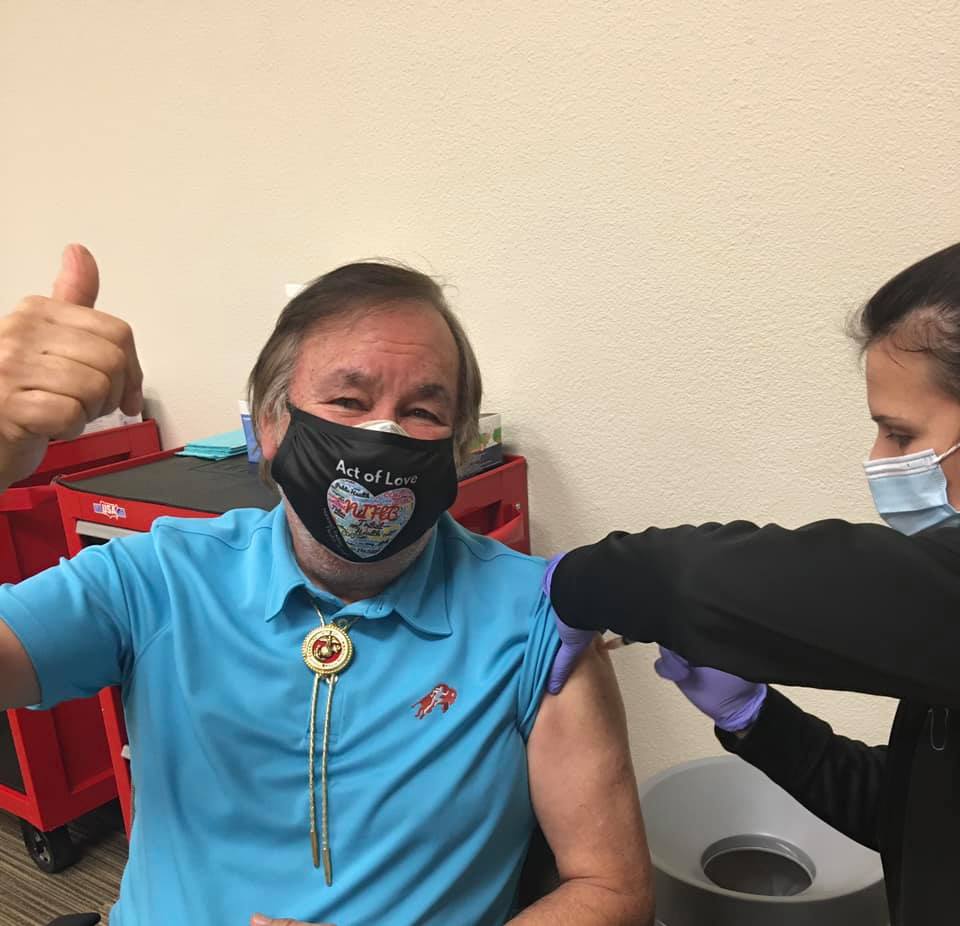
- Details
- By Levi Rickert
The Covid-19 pandemic has been devastating in Indian Country.
The Centers for Disease Control and Prevention (CDC) report Native Americans are four times more likely to be hospitalized and have 2.5 times the death rate than their white counterparts from the deadly virus. Particularly, among American Indian and Alaska Native elders Covid-19 has taken a tremendous toll. Tribes have lost many fluent speakers of their tribal languages.
The good news is that rates of Covid-19 vaccinations in Indian Country have surpassed the rates of individual states administering the vaccine.
President Joe Biden said Wednesday the United States has administered 200 million Covid-19 vaccinations in the country. It was quite an achievement considering the president promised early in his administration that the goal for his first 100 days in office was to have 100 million Americans vaccinated. That goal was hit on the president’s 58th day in office. Once that goal was met, the president doubled down and set a new goal to have 200 million vaccinated by his 100th day in office. With eight days to spare, that goal was achieved.
More than 80 percent of Americans over 65 have had at least one vaccine as of Thursday, according to President Biden.
On Navajo Nation, the epicenter of the Covid-19 pandemic in the United States last spring, saw almost half of Navajo citizens living on the reservation vaccinated. Nearly 90 percent of allocated doses have been administered.
It is fair to assume that the high percentage of vaccinations in the Navajo Nation have helped curb the devastating rates of coronavirus cases and deaths. This past week, the Navajo Nation reported some days with single-digit new Covid-19 cases and went 10 consecutive days without one Covid-related death.
In South Dakota, on the Cheyenne River Indian Reservation, tribal officials have taken down the blockades last year that were set up to stop non-reservation residents from entering the reservation, which helped to safeguard the tribal community from Covid-19 mass outbreaks.
This is good news for Indian Country and is attributable to the distribution of vaccines among tribes. In recent weeks, the supply of vaccines has exceeded the demand on Indian reservations. Several tribes have opened up vaccine administration to non-Native residents from neighboring towns and cities. Access to an excess supply of vaccines was offered by the Confederated Tribes of Grand Ronde in Oregon to the Portland Trail Blazers, who took the tribe up on the offer and sent 12 players to become vaccinated.
Even with the success of having over 200 million vaccinations across the United States and the supply outnumbering the demand in Indian Country, a new problem is now confronting the nation and Indian Country: we have hit a vaccine hesitancy wall.
“We knew we were going to hit this point,” CDC Director Dr. Rochelle Walensky said on NBC News on Thursday. “Now comes the hard work of working with our community corps, trying to understand why people may be hesitant.”
Vaccine hesitancy is the result of fear, distrust and even ignorance—or a combination of all three. As Native Americans we have been distrustful of both the government and some modern medicine.
Obviously, everyone has to decide for themselves. However, we as Native people have been taught to think beyond ourselves. We do things for the good of family and community.
“I am well aware of the suspicions we as Native Americans have toward taking the Covid-19 vaccine. However, with a global pandemic declared by the World Health Organization, and if unchecked, the potential of the virus killing millions and millions of people until global immunity is reached, I decided to place my trust in our scientists who study and research infectious diseases,” Olympic Gold-medalist Billy Mills (Lakota) told Native News Online in January soon after he received his first vaccine shot.
Mills, the only American to ever win the 10,000 meters in Olympic competition, praised scientists for working hard to get the life-saving vaccine developed and to the public in record speed.
The vaccine has obviously helped reverse the large number of deaths in the Navajo Nation. My hope is that we, as Native people, overcome any hesitancy we have for the vaccine for the good of our tribal communities and the world at large.
More Stories Like This
Colorado cannot heal until it confronts Sand Creek honestlyNative American Mothers Deserve to Live
Technology Rooted in Tradition is Strengthening Cherokee Nation
The Lumbee Tribe of North Carolina: #575
Tribes Do Not Need a Greenlight to Build Renewable Energy
Help us defend tribal sovereignty.
At Native News Online, our mission is rooted in telling the stories that strengthen sovereignty and uplift Indigenous voices — not just at year’s end, but every single day.
Because of your generosity last year, we were able to keep our reporters on the ground in tribal communities, at national gatherings and in the halls of Congress — covering the issues that matter most to Indian Country: sovereignty, culture, education, health and economic opportunity.
That support sustained us through a tough year in 2025. Now, as we look to the year ahead, we need your help right now to ensure warrior journalism remains strong — reporting that defends tribal sovereignty, amplifies Native truth, and holds power accountable.
 The stakes couldn't be higher. Your support keeps Native voices heard, Native stories told and Native sovereignty defended.
The stakes couldn't be higher. Your support keeps Native voices heard, Native stories told and Native sovereignty defended.
Stand with Warrior Journalism today.
Levi Rickert (Potawatomi), Editor & Publisher

